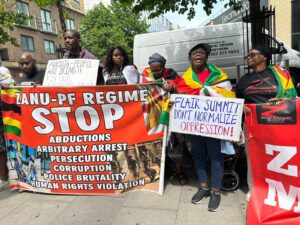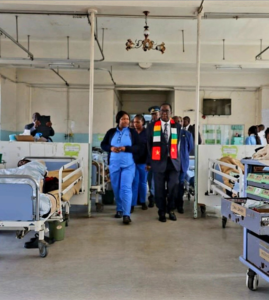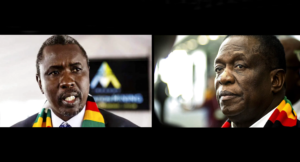GOVERNMENT CRACKS DOWN ON PROTESTS AHEAD OF SADC SUMMIT

The Zimbabwean government is making serious efforts to stop any protests or gatherings before the upcoming Southern African Development Community (SADC) summit. The summit, which will be held in Harare next month, is very important for the government. They are worried that there might be protests in front of the regional leaders, which could embarrass them.
President Emmerson Mnangagwa’s government is focusing a lot on this summit. This is especially important because the SADC election observer mission did not approve of the general elections held last year. They said the elections were flawed. The government wants to gain political support during this summit, so they are doing everything they can to make sure it goes smoothly.
To prepare for the summit, the government is spending a lot of money. They are building new roads, constructing villas, fixing hotels, and even buying new buses to transport people during the summit. This shows how seriously they are taking the event.
However, in their effort to make sure everything looks good, they have been taking harsh actions against anyone who they think might cause problems. One of the most recent events happened today, when the police violently stopped a meeting of the Zimbabwe National Students Union. The meeting was supposed to take place at the Zesa National Training Centre in Harare. It started at 10am, but the police arrived and stopped the meeting. Around 60 students were there, and most of them were beaten. Some of the students were also arrested and taken to Harare Central Police Station. The police’s actions were a clear violation of the students’ constitutional rights, which allow them to gather, express themselves, and associate with others.
This is not the first time that the police have taken such actions. In recent weeks, there have been many cases of arrests and harassment. On June 16, former minister and MP Jameson Timba and a group of 78 people were arrested in Avondale, Harare, for simply gathering for a braai to commemorate South Africa’s Soweto Uprising (Youth Day). These arrests show the government’s fear of any kind of gathering or protest that might take place before the summit.
Another example of this repression is the case of opposition leader Job Sikhala. He was released from prison on January 30 after spending 595 days behind bars. He was originally charged with inciting public violence, but the High Court dismissed his conviction this week. Sikhala was also accused of communicating false statements harmful to the state under a law that no longer exists, but the court cleared him of that charge as well.
The rights to freedom of expression, association, and peaceful assembly are being restricted in Zimbabwe, especially during the election period. Now, as the SADC summit approaches, the government seems even more determined to stop any opposition. People linked to the opposition are often the main targets of these harsh actions. They are arrested and prosecuted without good reason.
A new law called the “Patriotic Act” was recently passed. This law is an amendment to the Criminal Law (Codification and Reform) Act. It makes things even harder for activists and critics by imposing more restrictions and harsh penalties.
As the SADC summit gets closer, the tension in Zimbabwe is rising. The government’s tough approach shows that they are worried about protests and want to make sure the country looks stable to the regional leaders who will attend the summit. However, this crackdown is making many people nervous. The government’s actions are going against the principles of freedom and democracy, and many people are concerned about the future of the country.
The international community is watching Zimbabwe closely as the SADC summit approaches. Many are calling for the government to respect the constitutional rights of its citizens and allow people to gather and express themselves peacefully.
In the coming weeks, the government’s actions will be under a lot of scrutiny. How they handle the situation will have a big impact on the country’s political future and its relationship with other SADC members. Only time will tell if the government’s actions will stop the protests or if they will lead to more unrest in the country.



